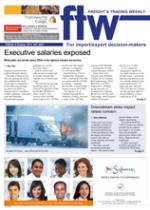A month after being
informed that dangerous
goods tankers entering
Zambia must comply with the
country’s specific standards
or face massive fines, South
African operators are yet to
be told what the standards
are.
According to Gavin
Kelly, spokesman for the
Road Freight Association,
they were informed by
Zambian authorities of the
two standards for dangerous
goods tankers entering
Zambia on September 10.
“We were told that all fuel
tankers, both foreign and
local, moving on Zambian
roads would be required to
be fully compliant with two
standards (ZS 371 and ZS
429-4) that would be enforced
by the Zambian Bureau
of Standards (ZABS) and
that the new standards had
already come into effect on
September 1,” he told FTW.
“But to date we have yet to
see the Zambian Standards
despite having asked for
copies immediately.”
He said it was extremely
difficult to comply with
standards if one did not know
what the standards were.
“This has a major impact
on any operators entering
Zambia as they can be fined
huge amounts of money
if they are found to not be
contravening the standards,
but we can’t seem to find out
what they are.”
He said last week an
RFA member was fined
$50 000 for not meeting the
requirements.
Authorities claimed the
dangerous goods vehicle
was still on the road after
6pm, which is why it was
fined. But indications are that
the driver was stopped just
before 6pm and purposely
prevented from travelling the
extra kilometre to park safely
and avoid the fine.
“He was told to park on
the side of the road and could
not drive the short distance to
the town. The requirements
seem to be very unreasonable
at times and hard to argue
against as we don’t have
copies of the standards.”
Kelly said if the standards
could be sourced it could
very likely be that the
Zambian standards are the
same as South Africa. “Then
it really is just a storm in a
tea cup, but at the same time,
the standards could be very
different and indications
at the moment are that this
is the case. Already South
African operators are being
stopped in terms of the new
regulations and told they do
not comply, but how are they
supposed to know what to
comply with?”
He said Zambian
authorities had been present
at a meeting in Pretoria in
August organised by the
Cross-Border Road Transport
Agency and had made no
mention of any new standards
for dangerous goods tankers.
“This seems to be just
another money-making racket
aimed at South African
operators,” he said. “We have
called on our local authorities
to apply the same measures
to Zambian truckers entering
South Africa and that
the Road Traffic Act be
implemented against these
vehicles to ensure they meet
our regulations.”
According to a spokesman
for ZABS, the documentation
on the standards can be
sourced from the information
centre in Lusaka and at all
the border offices.
“The measure has been
put in place in the interests
of protecting life, property
and road infrastructure
while guarding against
environmental pollution in
Zambia,” reads a statement
by the organisation. “The
measures have been
necessitated by increased
road traffic accidents,
some of them involving
fuel tankers, both local and
foreign. As appreciated by
all, these accidents do not
discriminate on the basis
of the origins of the fuel
tanker.”
INSERT
‘This seems to be
just another moneymaking
racket aimed
at South African
operators.’

